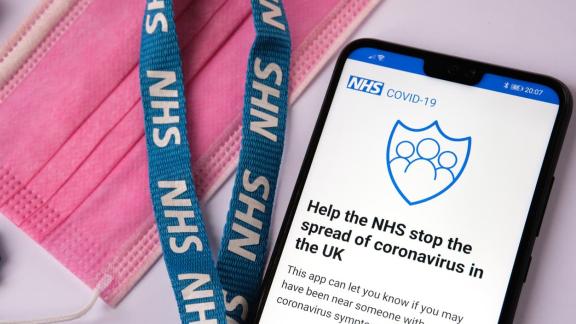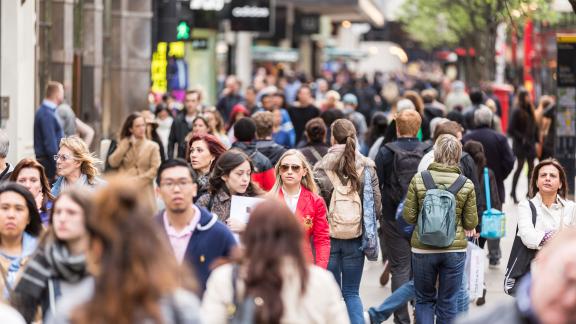NHS leaders sound alarm over government’s ‘Living with Covid’ proposals

- Nearly eight in 10 NHS leaders want the public to continue to have free access to Covid-19 tests, with nine in 10 wanting free access for key workers to continue.
- Three quarters would disagree with changing the legal requirement to self-isolate following a positive result to being advisory only.
- More than four in five would be against ending compulsory mask wearing in NHS and care settings.
Elective treatments, access to general practice and other routine care provided by the NHS could become disrupted if further strains of coronavirus are allowed to spread across the country with reduced national oversight.
This is a concern of health leaders as the Government prepares to confirm its “Living with Covid-19” strategy for England next week.
A week on from publication of the NHS Elective Recovery Plan, which sets out how the waiting list of over 6 million people will be tackled, the NHS Confederation is calling on the Government to take a cautious and evidence-based approach to exiting the pandemic so that the NHS can continue to meet the full healthcare needs of the population.
It is widely rumoured that the plan will bring an end to free lateral flow tests for millions of people, as well as an end to mandatory self-isolation for anyone with a positive result from as early as next month. This is as both hospital admissions and deaths linked to the virus continue to fall nationally, thanks in large part to the success of the vaccine roll out and the new Covid treatments that the NHS is delivering.
In a poll of more than 300 of the most senior leaders in the NHS in England carried out by the NHS Confederation, nearly eight in ten leaders (79%) strongly disagreed or disagreed with the plan to stop free access to Covid-19 tests for the public, with 94% feeling the same about NHS staff and other key workers. NHS staff are currently required to test at home twice a week.
Also, three quarters (75%) of health leaders who responded to the survey disagreed or strongly disagreed with the proposal to change the legal requirement to self-isolate following a positive result to being advisory only. The rules currently state that people must self-isolate for ten full days from when their symptoms begin or when they test positive, with opportunities to exit after five days if certain conditions are met.
The survey was carried out by the NHS Confederation between Monday 14 and Wednesday 16 February 2022, covering health leaders across NHS acute, mental health, community and ambulance service trusts, primary care, clinical commissioning groups and integrated care systems in England. 307 people took part.
Matthew Taylor, chief executive of the NHS Confederation, said: “Hospital admissions and deaths linked to coronavirus continue to fall nationally and this is allowing the NHS to bring back many routine services that it was asked to deprioritise during the peaks of the pandemic, including some non-urgent elective procedures. With the success of the vaccine and new Covid treatments, this offers real hope as we learn to live with the virus.
“But the Government cannot wave a magic wand and pretend the threat has disappeared entirely. So much is uncertain still, including our long-term immunity and the emergence of future strains, which requires a solid testing infrastructure and clear guidance around self-isolation to remain in place.
“A lot is at stake for the NHS’s recovery ambitions if the Government is too gung-ho in its plans for exiting the pandemic, which is why health leaders are calling for a cautious and evidence led approach. This must not be driven by political expediency.”
Elsewhere in the poll, more than four in five (82%) health leaders disagreed or strongly disagreed with the proposal that there should be an end to compulsory mask wearing in NHS and care settings. While the Government has confirmed that PPE will remain free for all health and care settings in England throughout 2022/23, infection prevention and control guidance for the NHS has not confirmed future arrangements about the use of face coverings and other measures by staff, patients and visitors as the national response to coronavirus evolves.
One NHS leader responding to the survey said: “Masks will protect vulnerable patients who will otherwise be nervous about coming in, and our staff from Covid and other circulating respiratory viruses. Levels are still too high to stop wearing masks."
Also in the survey, 83% of health leaders who took part in the poll said they do not want the weekly ONS infection survey, which has been tracking infection rates and antibodies across households since June 2020, to come to an end. This follows suggestions that it could be scrapped or drastically scaled back as part of the Government’s plans. If this happened, it would mean that the country’s ability to detect new variants will be limited significantly.
Health leaders have also been clear that the need for continued communications about the importance of good public health measures, such as handwashing, ventilation and the wearing of face coverings in indoor settings, which could reduce transmission of coronavirus should continue.
One respondent to the survey said: “Reducing our information about spread is crazy at this stage.”
Another said: “If this coming winter will include flu, Covid and other pressures, it would be useful to know exactly what pressure Covid is putting on hospitals. We don't know how the pandemic will develop.”
Dr Katherine Henderson, President of the Royal College of Emergency Medicine, said: “There are still high levels of coronavirus in the population and there are many people who remain vulnerable to serious illness. ‘Living with Covid’ means us accepting the consequences for these people as individuals but will also put further pressure on an already pressurised, understaffed health service that is short of beds. Meanwhile lifting restrictions will skip a whole phase of ‘recovery’ that will make it even more difficult to achieve the government’s ambitions in the elective care delivery plan.
“There is already a risk that the elective care plan will be quickly derailed by the crisis in Emergency care but lifting restrictions and revoking free testing could lead to a new wave of covid pressures on Emergency Departments, which will disrupt elective care even further.”
Professor Dame Helen Stokes-Lampard, Chair of the Academy of Medical Royal Colleges, said: “This poll confirms what many of us have been thinking and saying since the announcement about relaxing the rules early in England was made. That is that it all feels very sudden and more driven as much by the current political pressures than by robust scientific guidance. We do have to learn to live safely with Covid in the medium term, that does not mean pretending the threat to our health and in some cases life simply no longer exists. We should take a more gradual, phased approach to relaxing the rules and carefully watch what happens to the rates of infection - particularly in healthcare settings or other environments where people are particularly at risk. We also need the ONS survey of cases to continue so that we have accurate data on which to base future decisions.”
About us
We are the membership organisation that brings together, supports and speaks for the whole healthcare system in England, Wales and Northern Ireland. The members we represent employ 1.5 million staff, care for more than 1 million patients a day and control £150 billion of public expenditure. We promote collaboration and partnership working as the key to improving population health, delivering high-quality care and reducing health inequalities.



